Wait…didn’t you just walk through a sea
You would think that, after witnessing the ten plagues, crossing the Red Sea, and being miraculously delivered from 400 years of slavery, the Israelites would have left the “ye of little faith” camp and taken up permanent residence in the “ye of big unshakeable faith” camp.
But no.
Just weeks after being rescued from centuries of slavery, the Israelites come to Moses and Aaron saying—AND I QUOTE: “If only we had died by the hand of the Lord in the land of Egypt, when we sat by the fleshpots and ate our fill of bread; for you have brought us out into this wilderness to kill this whole assembly with hunger.” (Exodus 16:3)
“If only we had died…”
It’s like when your 5-year-old wails that you never let them do anything fun—conveniently forgetting the park visit and ice cream they had earlier that day.
Or when the WiFi goes out for 11 minutes, and your teenager’s life is, like, literally ruined.
Except this is 50,000x worse.
We’re not talking about people whose ancestor’s ancestor’s ancestors were slaves. No, this happened ONE MONTH after the Exodus.
Thirty-one days after walking through a parted sea and watching the Egyptians be destroyed (see below), Israel is not just complaining—they are romanticizing Egypt, wishing they had died as slaves ‘cause at least there was bread.
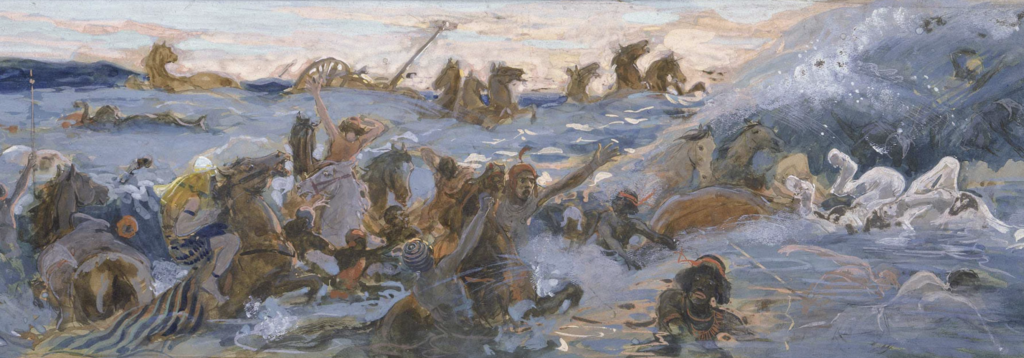
At this point, I think most parents would have turned the proverbial van around and said, “Good luck with that,” before kicking up dust on the way out. Or at the very least, they would have been very tempted to.
But instead of punishing their doubt or sending them back to Egypt, God gives them exactly what they need—enough for each day.
And just like the Israelites, we forget who provides for us. We live panicked, restless, anxious, unanchored—grasping for control instead of receiving what’s already given.
What’s the answer? We don’t need certainty (though, it does feel like it!). We need steadiness. We need something that anchors us in God.
And this is exactly what the Desert Fathers sought—a way to remain rooted in God, no matter the uncertainties of life. Among them, Abba Isaac stands out as a guide, offering us a simple but powerful path to steadiness through prayer.
A monastery in the middle of motherhood
Abba Isaac (different from Father Isaac in Genesis!) is one of the Desert Fathers featured in John Cassian’s Conferences, a foundational text of early Christian monastic spirituality. Though his teachings on prayer have deeply shaped monastics—including St. Benedict and Evagrius Ponticus—we actually know very little about him personally.
But, based on context, we can infer that Abba Isaac was a revered leader in a rigorous monastic community outside of Cairo, deeply immersed in a life of solitude, prayer, and spiritual discipline.
And while much of what he said centered on monks and their spiritual development, his wisdom reaches beyond the monastery walls.
We may not be called to a life of solitude in the desert (as much as we wish for it some days!), but we are called to a kind of spiritual monasticism—a life where prayer is not just an activity, but a way of being.
The monastic ideal is not about location—it’s about posture. It’s about cultivating an interior monastery, a heart that is quiet before God even in the noise of daily life. The word monk comes from the Greek word “monachos” (μοναχός), which means “solitary” or “alone.”
And the goal of the monk’s life is for a single purpose: to live for God alone. It’s a call we as mothers and spiritual mothers are called to as well, but instead of physical solitude, we are to love God above everything else and serve in our vocations for love of Him.
But how do we do this? How do we cultivate that interior monastery, where our hearts are fixed on God even in the middle of life’s chaos?
The Desert Fathers knew the answer: prayer is the foundation.
Just as a physical monastery is built stone by stone, the interior monastery is built prayer by prayer. It is what steadies us, anchors us, and transforms the noise of daily life into an offering to God. Without prayer, the monastery crumbles.
And Abba Isaac, in particular, gives us a simple but powerful way to build this life of prayer—one that doesn’t require a desert cave or a monastery but can be lived right where we are.
He begins with a simple question: “What is prayer?”
For many of us, prayer is that thing we try to squeeze in—before the day begins, before we close our eyes at night, or right before dinner as our family lunges for their food. Maybe we manage a couple of decades in the car or whisper a Hail Mary over a crying child.
We fit prayer into life. It’s important, yes, but it often gets squeezed between obligations, instead of anchoring them. We try to schedule it, check it off, be “good” at it—but it still feels like something separate from the rest of life.
But what if prayer wasn’t something we scheduled, but something we lived?
What if prayer was as natural as breath—not a task, or a labor put upon us, but a rhythm woven into our moments, our thoughts, our being.
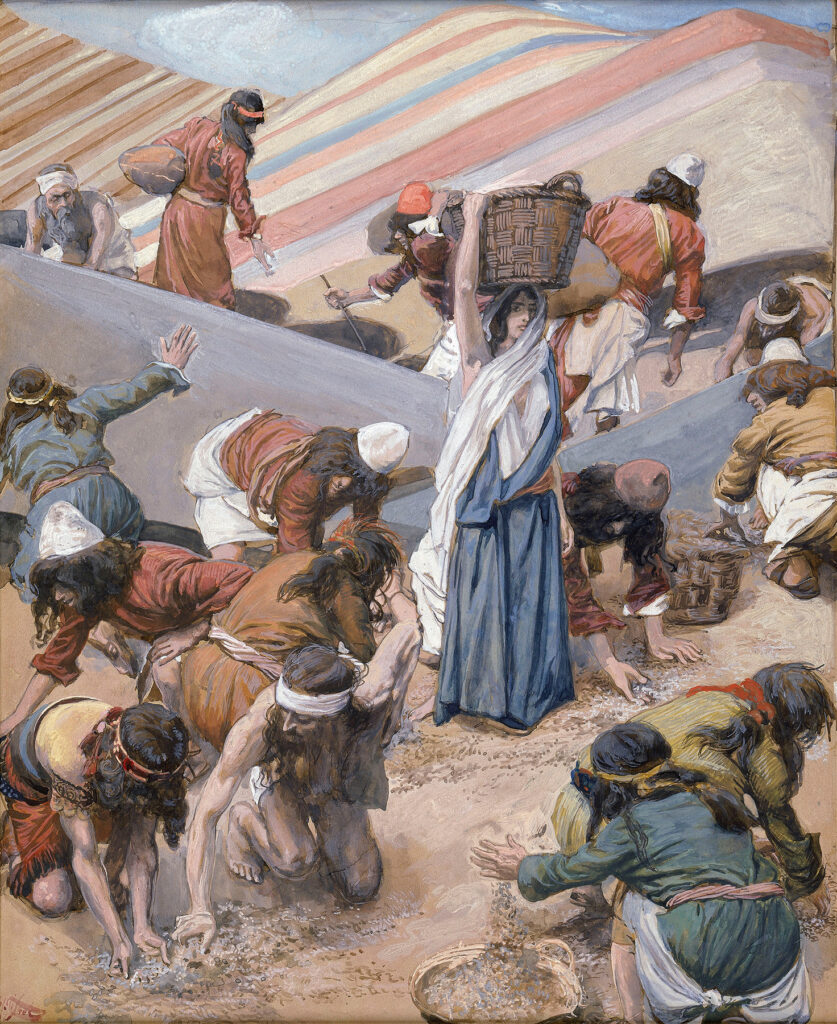
When freedom feels scarier than slavery
If there was any group of people who knew about relentless labor, it was the Israelites.
Under Pharaoh’s scepter, they toiled—making bricks, hauling water, never stopping. For hundreds of years, they cried out for deliverance while bending under whip and the weight of building an empire.
And then, deliverance came. Swift and powerful. God split the sea, swallowed their oppressors, and led them into freedom.
But here’s the thing about freedom: it requires trust.
And Israel—fresh out of slavery, fresh out of Egypt—didn’t know how to be free. They still lived like slaves.
They didn’t know how to rest because they had spent their lives in endless toil. They didn’t know how to receive because they had been trained to survive.
And so, when hunger set in, they panicked.
Instead of trusting that the God who parted the sea would also fill their stomachs, they longed for the predictability of slavery.
So when they came to Moses complaining and fearful, the Lord responded “I am going to rain bread from heaven for you, and each day the people shall go out and gather enough for that day.” (Exodus 16:4).
When the Israelites awoke each morning, they found a fine flaky substance, as fine as frost on the ground. (Exodus 16:14) Which was… super confusing. It was like nothing they had seen before, and when they asked Moses, he said, “It is the bread that the Lord has given you to eat.” (Exodus 16:15)
There! Good! Problem solved.
But Israel didn’t listen. Despite God’s specific command to only take enough for each day, they took more. They hoarded and stuffed the mana from heaven away for “just in case.” And each time they did so, the mana rotted.
It should’ve been fine. No more hunger, no more worry. But the real problem was never the bread. It was about hearts that didn’t trust.
Because trust isn’t just a thought—it’s a posture. A way of leaning toward God or away from Him.
The Israelites still lived like slaves because their hearts had not been reoriented toward God’s provision. They didn’t know how to receive from Him without grasping for control.
And honestly? Neither do we.
We may not be hoarding manna, but we hoard security. We stockpile plans, control, busyness, information—anything that makes us feel safe.
But if our hearts aren’t learning how to rest in Him, then our hands will always be full of the wrong things.
That’s why the Desert Fathers spoke so much about the heart.
The battle for your heart begins here
“Posture of the heart.”
It’s one of those theological-sounding phrases that you kinda think you understand but it also feels like there are a few layers you’re missing. What does it mean?
For the early monastics and desert fathers, the heart wasn’t just a muscle in the chest or the place where all the feelings live.
They saw the heart as the command center of a person where desires take shape, decisions are made, and our deepest commitments are formed. Their view lines up with the Biblical idea of the heart as the epicenter of thought, intention, and transformation—not just a place for emotions, but the place where who we are and what we love is decided.
We find this distinction all throughout scripture:
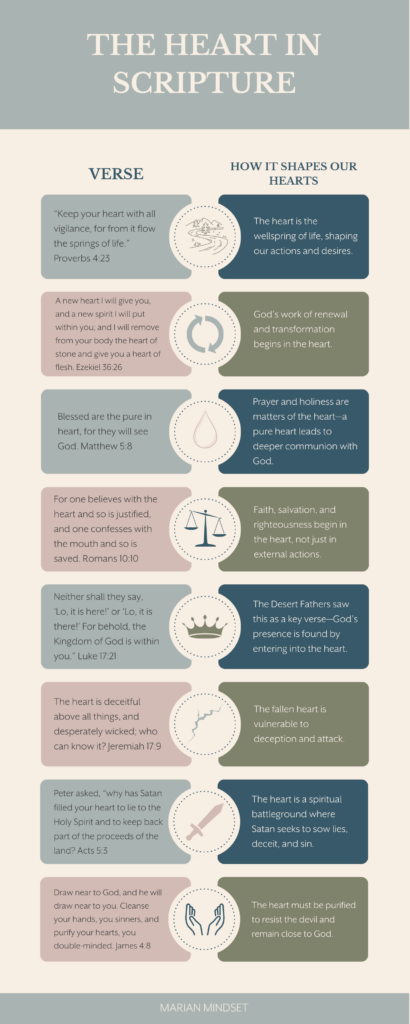
If the heart is the epicenter of who we are, then the real question is: How do we draw it into prayer?
Because if prayer is just words, it stays on the surface. But if prayer is anchored in the heart, it transforms us.
And this is where things get hard.
Prayer doesn’t often come naturally to us. We offer up something half-hearted. We start the Our Father, only to lose focus halfway through. We sit down to pray but suddenly remember five things we forgot to do.
And when we finally sit down and focus, we wonder: Am I even doing this right? Without “real-time” responses from God, it’s easy to feel that we’re only talking to a dark room or, worse, just talking to ourselves.
We’ve heard that prayer is supposed to be the foundation of our relationship with God, so why does it feel so one-sided? Why does it conjure the same resistance as scheduling appointments or dealing with the insurance company?
But that’s exactly why we need prayer.
Not the kind we try to squeeze in between responsibilities. Not the kind we offer up in a rush before moving on to the next thing. But the kind of prayer that steadies us, grounds us, and forms our hearts in trust.
And that’s what Abba Isaac teaches us.
In his conversation with John Cassian, Abba Isaac explained that the goal of prayer isn’t length—it’s transformation. True prayer isn’t about more words; it’s about training the heart to remain in God’s presence.
So he offered a simple, practical way to keep the heart fixed on God by praying without ceasing. A way that doesn’t rely on feelings, perfect focus, or long-winded prayers.
Pray like a desert father—in the middle of your mess
Abba Isaac explained that, in the same way we teach our kids one letter and sound at a time and build until they can read, so we need a simple, steady focus when learning to pray without ceasing.
And that starts by fixing our hearts on a single, short prayer, keeping it always before us, and returning to it again and again. When we keep that practice, we will climb to deeper spiritual insight.
St Benedict, one of the students of John Cassian wrote his rule, “We must know that God regards our purity of heart and tears of compunction, not our many words. Prayer, therefore, should be short and pure, unless it is prolonged by the inspiration of divine grace.” (Rule of St. Benedict, Chapter 20: On Reverence in Prayer)
Simple and short is the goal here.
Many of the desert fathers used the verse Psalm 69:2 as their constant prayer: “O God, make speed to save me: O Lord, make haste to help me.”
They chose this verse, Abba Isaac points out, for a good reason—because it contains everything we need.
- It calls out to God for help in every situation.
- It’s a confession of our weakness and our need for Him.
- It keeps us alert, reminding us of both God’s presence and the enemy’s attacks.
- It expresses trust—knowing that God is near, that He sees us, and that He will come to our aid.
- It is a shield against spiritual attacks, a wall of defense against the enemy, and a lifeline in moments of distress.
- It keeps us from despair, reminding us that God is never far.
- It keeps us from pride, making sure we don’t think for a second that we can handle life without God’s constant help.
It is the WD-40 of prayer, the all-purpose, anytime-you-need-it verse that covers every situation. No matter where we are in life, this prayer applies to every single moment because we are always in need of God.
If things are difficult, we need this prayer. If things are going well, we need this prayer just as much.
Of course, you can pick your own short prayer to take with you every day. Here are some ideas:
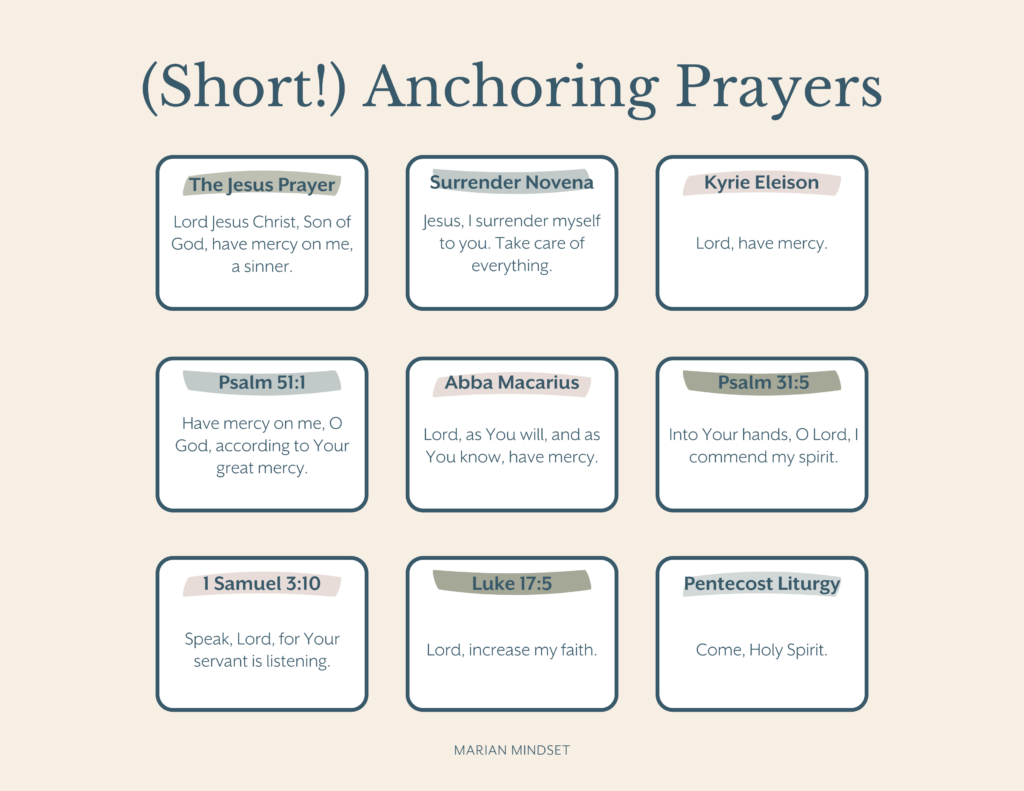
But Abba Isaac didn’t just teach that short, frequent prayer was helpful—he saw it as the beginning of praying without ceasing. Constantly redirecting the heart throughout the day is what allows your soul to turn toward God instinctively, like a feather that is, as Abba Isaac said, “borne aloft almost naturally to the heights of heaven by the lightness of its nature, and the aid of the slightest breath.” (Cassian, Conference 9, Chapter 4)
Constantly turning your heart back to God with a short prayer is what opens the gate to purity of heart and divine intimacy (which we also call contemplative prayer).
The silent, ceaseless prayer
“Divine intimacy”—ah, yes, another one of those theological phrases that you nod along to (but also question what exactly it means for you. Maybe you wonder if you even want it. Because, honestly, it sounds like a lot of work and something that’s only for the really holy people.
But actually, divine intimacy—true union with God—goes beyond words and thoughts. It moves from speaking and reflecting to simply being with Him.
The catechism tells us that contemplative prayer is the third kind of prayer, following vocal prayer and meditative prayer. (CCC 2558–2865—Highly recommend you revisit this part of the catechism if you haven’t recently!) Here’s a quick breakdown of the vocal and meditative:
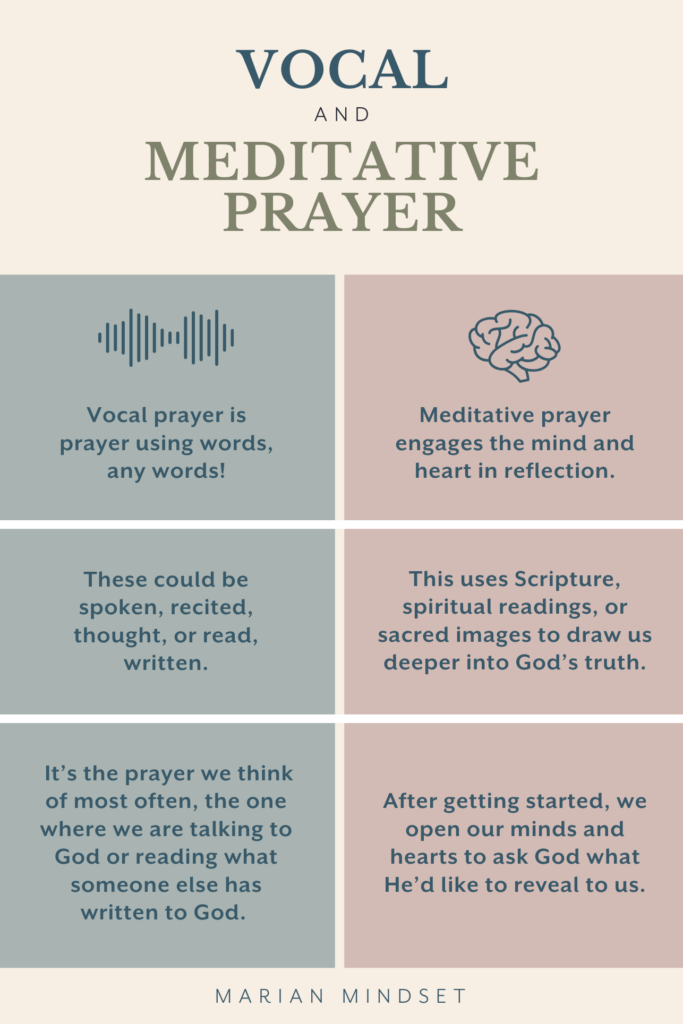
Contemplative prayer, though, is different. The other two kinds of prayer take time, effort, and some degree of conscious thought. Even whispering that short phrase Abba Isaac asked us to memorize takes a few brain cells. But the only thing that contemplative prayer requires is for us to just be.
In the words of St. Teresa of Avila, “Contemplative prayer, in my opinion, is nothing else than a close sharing between friends; it means taking time frequently to be alone with Him who we know loves us.” (CCC 2709)
The desert fathers, of course, could physically be alone with Jesus. And there is so much value to that. Contemplative prayer is truly done best when the body can be still and quiet, but we know that’s not always possible with home and work demands (and people in your home who enjoy eating dinner).
So, what would it look like to be alone with Jesus in our heart? What would it mean to invite him in and ask him to be part of your day? What if you could be with Jesus without always having to keep a running conversation with him? What if sometimes, the two of you just exist together, side by side?
Picture this: You invite a friend over for the afternoon. She sits on the barstool at your kitchen island as you prepare dinner. The two of you chat, but you also expect some interruptions and distractions. A toddler wanders in with a runny nose. You need to count out loud (sometimes twice 🙃) as you measure the cups of broth for the soup.
You don’t send your friend home in those moments. She probably jumps into the chaos without even asking. Maybe you return from handling Round 700 of “she isn’t sharing with me” of the day to find her stirring your soup. “I didn’t want it to burn,” she says.This is the busy woman’s version of contemplative prayer. It’s inviting Jesus to stay in our hearts as we do all the things we need to do in a day. We don’t ‘quit prayer’ to go do the next task. We may pause the vocal prayer, but we remain anchored in him as we move on. This kind of prayer is how we learn to remain with God.
To pray continually is to embrace dependence rather than control. It is to trust that God will provide the grace we need, moment by moment.
And this can feel like an insurmountable task.
As women with busy lives, it’s easy to look at the desert fathers as spiritual giants much further in their walk of faith than us.
But in the Saying of the Desert Fathers, we read that, “It was revealed to Father Anthony in the desert that there was one who was his equal in the city. He was a doctor by profession and whatever he had beyond his needs he gave to the poor, and every day he sang the Trisagion with the angels.” (The Sayings of the Desert Fathers, translated by Benedicta Ward, 1975)
Despite Anthony’s radical faith, moving to the desert and being totally dependent upon God, we see that an ordinary person, a doctor (no doubt very busy with patients) was his equal in faith.
We too are called to this kind of faith—not by abandoning our families or fleeing to the wilderness, but by making prayer the foundation of our daily lives.
The desert fathers weren’t holy because of where they lived; they were holy because of how they lived. And Abba Isaac reminds us that we don’t need a monastery or a desert cave to cultivate the same deep intimacy with God.
We need only a heart that remains fixed on Him, a heart that believes He enters into each moment with us—through a whispered conversation with Him in the kitchen, choosing to see His beloved children who are now screaming in the car, noticing the way He provides our very breath in the quiet moments before sleep.
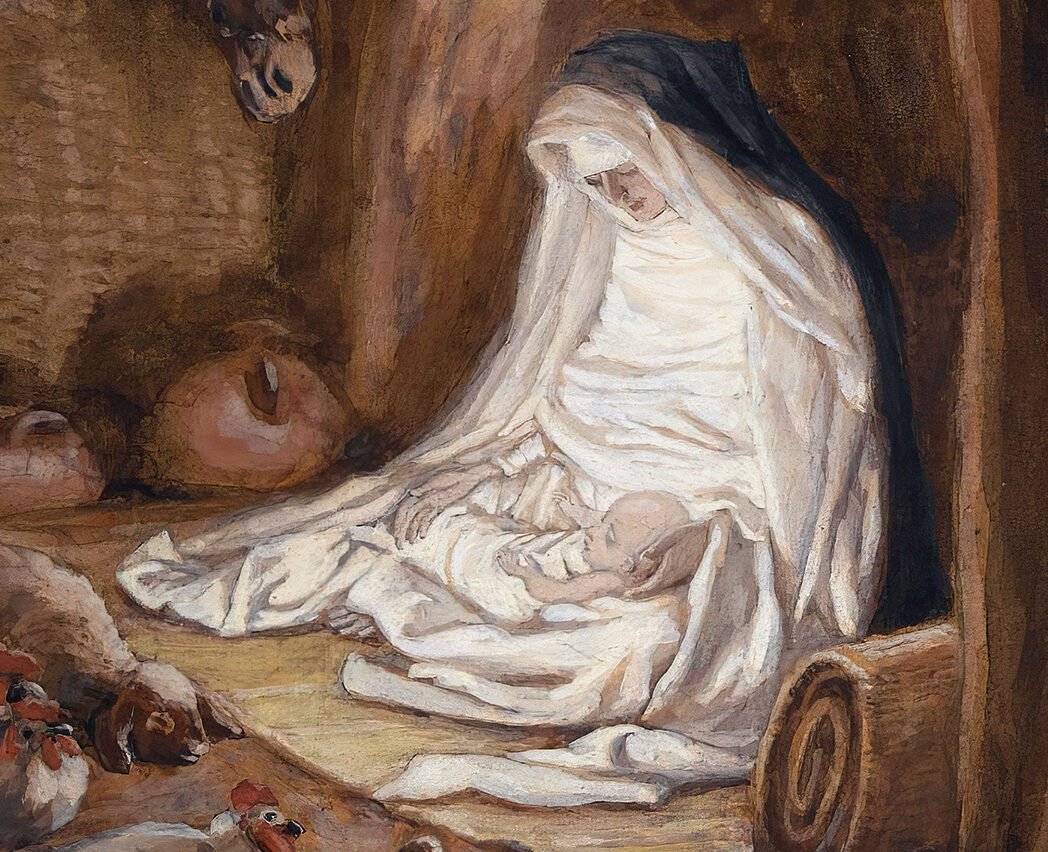
Mary and the manna
So, if we have our prayer, how exactly are we supposed to pray without ceasing?
That sounds great, but we can’t just drop everything and spend our entire day at a kneeler. We have kids to feed, emails to answer, meals to make, and responsibilities that demand our attention.
But that’s where our thinking needs to shift. None of those things are separate from God. We don’t pray around our lives—we pray through them, because everything we do is only possible through Him, with Him, and for Him.
Abba Isaac and the Desert Fathers saw prayer as the foundation, not an interruption. They didn’t carve out time away from life to pray; they invited God into everything.
And in doing this, they weren’t just following their monastic wisdom—they were following Mary.
Because if anyone lived the reality of prayer woven into daily life, it was her. Mary knew immediately what the Israelites struggled to understand: the manna was never just about bread.
It was always pointing to something greater.
Generations later, Jesus would stand before a crowd and say:
“Your ancestors ate the manna in the wilderness, yet they died. But here is the bread that comes down from heaven, which anyone may eat and not die. I am the living bread that came down from heaven. Whoever eats this bread will live forever.” (John 6:49-51)
Jesus is the true manna, the ultimate daily bread—not just sent from heaven but come down in the flesh.
And Mary received Him first.
Long before anyone else recognized Jesus as the Bread of Life, Mary carried the Bread of Life within her.
She trusted where Israel doubted.
She received where Israel resisted.
She surrendered where Israel grasped.
Her yes brought the Living Bread into the world, the bread that would not just sustain life for a day, but give eternal life to all who receive Him.
And just like the Israelites had to gather the manna day by day, we are called to receive Jesus daily—not storing up faith for later, not hoarding spiritual security, but trusting God to provide the grace we need for today.
Jesus tells us this explicitly when he teaches us how to pray.
When He teaches us to pray, He doesn’t tell us to ask for a stockpile of blessings, a safety net of grace, or a lifetime supply of certainty. He teaches us to ask for daily bread.
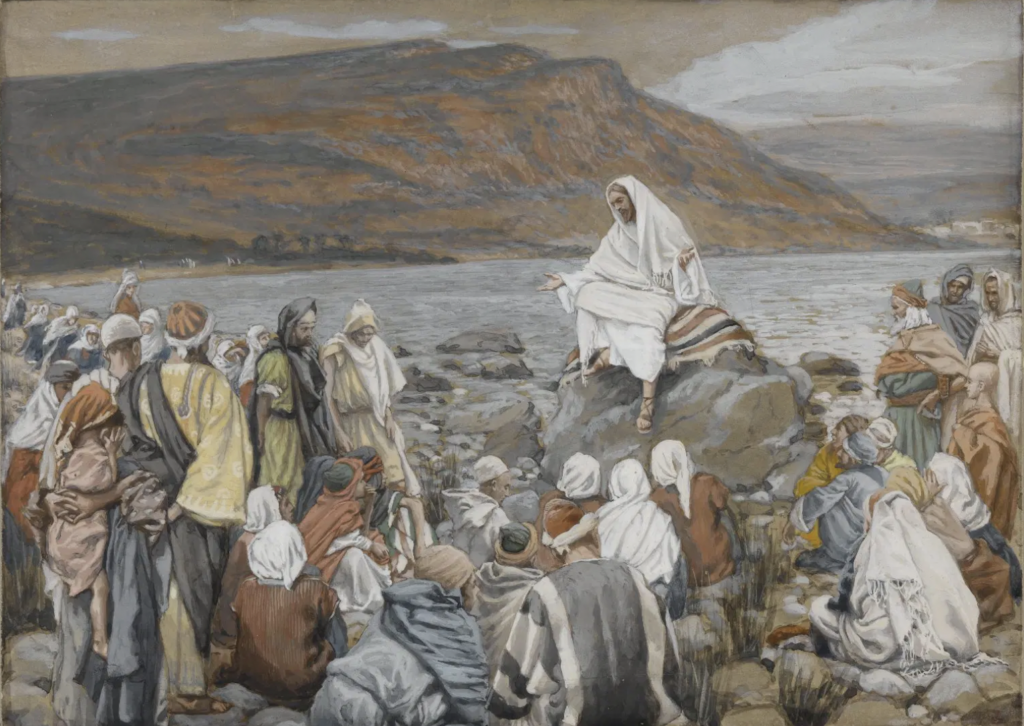
“Give us this day our daily bread.” (Matthew 6:11)
It’s a prayer of dependence. Of trust. Of receiving.
The Greek word used for daily here is epiousios, a word so unique that it appears nowhere else in Scripture. Scholars believe it carries a double meaning—referring both to the bread we need for today and the supernatural Bread of Life, Jesus Himself.
In other words, when we pray the Our Father, we aren’t just asking for food on the table. We’re asking for the grace, strength, and presence of God that will sustain us right now—not in a hypothetical future, but in this moment.
Perhaps we’d do better to think of it as our moment-to-moment bread; the grace that sustains us in each task we undertake. As we walk into the next room, we realize that God’s provision comes with us as we clean up the mess, change the diaper, or answer that phone call.
Just like the Israelites had to gather manna each morning, just like Mary received Jesus into her very being, we are called to receive Him today.
Not tomorrow. Not when life slows down. Not when we feel holier or more prepared. Now.
And the most beautiful part is that, if we ask, if we pray, God will always oblige. He will always supply us with exactly what we need. He delights in offering us everything: “Fear not, little flock, for it is your Father’s good pleasure to give you the kingdom.” (Luke 12:32)
God is not stingy with His grace. He is not reluctant to provide. He is a Father who loves to give good gifts, who rejoices in our asking, who delights in sustaining us day by day.
His provision is certain. His grace is enough. All we must do is come and ask and continue asking. When we trust in God’s daily bread, we will never leave the table empty.
Prayer was not an “extra” in Mary’s life; it was the breath of her soul, woven into every moment. She teaches us we don’t need a monastery to cultivate deep prayer—we need a heart that welcomes God into the small, ordinary moments.
So, how do we do that? How do we let prayer become our daily bread?
How to Pray Through Your Day
1. Turn chores into prayers
Instead of seeing prayer as something separate from your to-do list, invite God into the very fabric of your daily life. Offer up each task as a prayer:
- When folding laundry, pray for the person whose clothes you are folding.
- When cooking a meal, offer gratitude for God’s provision and pray for those who are hungry.
- When cleaning up messes, ask God to cleanse your heart and home of anything that doesn’t lead you closer to Him.
- When rocking a baby to sleep, meditate on the tenderness of God’s love for you.
Each moment becomes an opportunity to turn ordinary work into an offering of love.
2. Use breath prayers
A breath prayer is a short, simple prayer you repeat silently as you breathe in and out. This can be a powerful way to anchor your heart in God throughout the day:
- Inhale: “Jesus, I trust…” | Exhale: “…in You.”
- Inhale: “Come, Holy Spirit…” | Exhale: “…fill my heart.”
- Inhale: “O God, make speed to save me…” | Exhale: “O Lord, make haste to help me.
These short prayers can be whispered in the chaos of daily life—while driving, nursing a baby, waiting in line, or calming an upset child.
3. Turn frustration into an offering
Motherhood is full of small (and big) sacrifices, but instead of seeing them as burdens, unite them with Christ’s suffering for a greater purpose.
- Offer up sleepless nights for a friend who is struggling.
- Offer up the exhaustion of the day for someone who needs God’s grace.
- Offer up the frustrations of motherhood for the sanctification of your family.
A simple prayer like, “Jesus, I offer this to You,” shifts even the hardest moments into something sacred.
4. Let wordless love be a prayer (Or something that’s catchier than that)
Prayer doesn’t have to include words. Prayer is about being united to God, and what better way to do that than to adopt the disposition of Love Himself? “Your every act should be done with love” (1 Corinthians 16:14, NABRE)
- Try to deeply love each person before you—your child, your spouse, your friend, your client—and know that your love for them reflects God’s love.
- As you work at a behind-the-scenes task, actively search your heart for love of the people who will benefit from your unrecognized work.
- As you hear stories of others in your community or in our world—whether via the news, the gossip train, or someone reaching out and asking for prayers, pause to remember that they are loved by God and are your sister or brother in Christ.

Go Deeper: Pray the Lord’s Prayer with the Psalms
Prayer isn’t just about words—it’s about relationship. And when Jesus taught us to pray, He gave us a structure that anchors our hearts in trust and dependence: the Our Father.
But have you ever slowed down to truly pray through it—to let each phrase become an invitation to deeper communion with God?
If not, we highly recommend it. AND we’ve created a simple yet powerful resource to help you do just that. This guide walks you through each section of the Lord’s Prayer and pairs it with the psalms, helping you:
✅ Turn Jesus’ words into a personal conversation with the Father
✅ Pray with Scripture, allowing the psalms to shape your heart
✅ Find a rhythm of prayer that steadies you in daily life
Whether you have five minutes in the morning or need something to anchor you throughout the day, this guide will help you pray more intentionally and receive the daily bread of God’s grace.

+ show Comments
- Hide Comments
add a comment